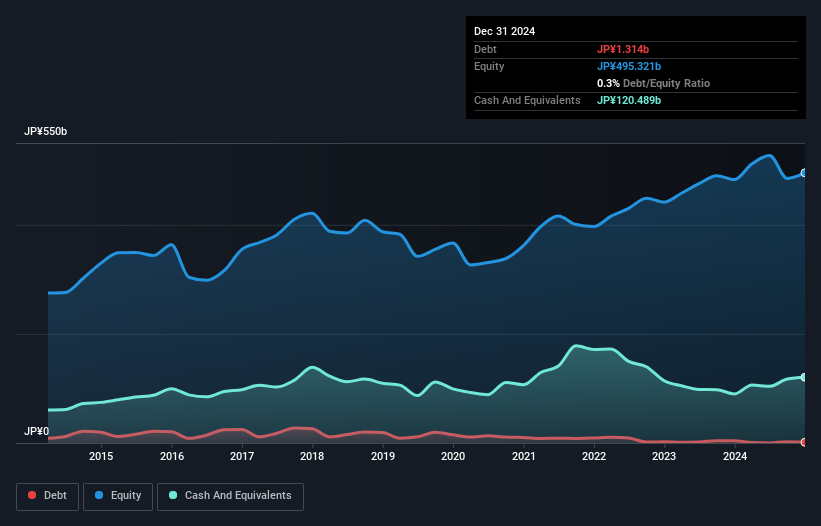David Iben put it well when he said, 'Volatility is not a risk we care about. What we care about is avoiding the permanent loss of capital.' So it seems the smart money knows that debt - which is usually involved in bankruptcies - is a very important factor, when you assess how risky a company is. We can see that Yamaha Corporation (TSE:7951) does use debt in its business. But the more important question is: how much risk is that debt creating?
Why Does Debt Bring Risk?
Debt and other liabilities become risky for a business when it cannot easily fulfill those obligations, either with free cash flow or by raising capital at an attractive price. In the worst case scenario, a company can go bankrupt if it cannot pay its creditors. However, a more frequent (but still costly) occurrence is where a company must issue shares at bargain-basement prices, permanently diluting shareholders, just to shore up its balance sheet. Of course, plenty of companies use debt to fund growth, without any negative consequences. When we think about a company's use of debt, we first look at cash and debt together.
See our latest analysis for Yamaha
How Much Debt Does Yamaha Carry?
As you can see below, Yamaha had JP¥1.31b of debt at December 2024, down from JP¥4.02b a year prior. However, it does have JP¥120.5b in cash offsetting this, leading to net cash of JP¥119.2b.

A Look At Yamaha's Liabilities
Zooming in on the latest balance sheet data, we can see that Yamaha had liabilities of JP¥99.9b due within 12 months and liabilities of JP¥38.9b due beyond that. On the other hand, it had cash of JP¥120.5b and JP¥83.8b worth of receivables due within a year. So it can boast JP¥65.5b more liquid assets than total liabilities.
This surplus suggests that Yamaha has a conservative balance sheet, and could probably eliminate its debt without much difficulty. Simply put, the fact that Yamaha has more cash than debt is arguably a good indication that it can manage its debt safely.
Also positive, Yamaha grew its EBIT by 22% in the last year, and that should make it easier to pay down debt, going forward. The balance sheet is clearly the area to focus on when you are analysing debt. But it is future earnings, more than anything, that will determine Yamaha's ability to maintain a healthy balance sheet going forward. So if you're focused on the future you can check out this free report showing analyst profit forecasts.
Finally, a business needs free cash flow to pay off debt; accounting profits just don't cut it. Yamaha may have net cash on the balance sheet, but it is still interesting to look at how well the business converts its earnings before interest and tax (EBIT) to free cash flow, because that will influence both its need for, and its capacity to manage debt. In the last three years, Yamaha created free cash flow amounting to 6.8% of its EBIT, an uninspiring performance. For us, cash conversion that low sparks a little paranoia about is ability to extinguish debt.
Summing Up
While it is always sensible to investigate a company's debt, in this case Yamaha has JP¥119.2b in net cash and a decent-looking balance sheet. And we liked the look of last year's 22% year-on-year EBIT growth. So is Yamaha's debt a risk? It doesn't seem so to us. The balance sheet is clearly the area to focus on when you are analysing debt. However, not all investment risk resides within the balance sheet - far from it. These risks can be hard to spot. Every company has them, and we've spotted 1 warning sign for Yamaha you should know about.
Of course, if you're the type of investor who prefers buying stocks without the burden of debt, then don't hesitate to discover our exclusive list of net cash growth stocks, today.
New: Manage All Your Stock Portfolios in One Place
We've created the ultimate portfolio companion for stock investors, and it's free.
• Connect an unlimited number of Portfolios and see your total in one currency
• Be alerted to new Warning Signs or Risks via email or mobile
• Track the Fair Value of your stocks
Have feedback on this article? Concerned about the content? Get in touch with us directly. Alternatively, email editorial-team (at) simplywallst.com.
This article by Simply Wall St is general in nature. We provide commentary based on historical data and analyst forecasts only using an unbiased methodology and our articles are not intended to be financial advice. It does not constitute a recommendation to buy or sell any stock, and does not take account of your objectives, or your financial situation. We aim to bring you long-term focused analysis driven by fundamental data. Note that our analysis may not factor in the latest price-sensitive company announcements or qualitative material. Simply Wall St has no position in any stocks mentioned.
About TSE:7951
Yamaha
Engages in the musical instruments, audio equipment, and other businesses in Japan and internationally.
Flawless balance sheet average dividend payer.
Similar Companies
Market Insights
Community Narratives



